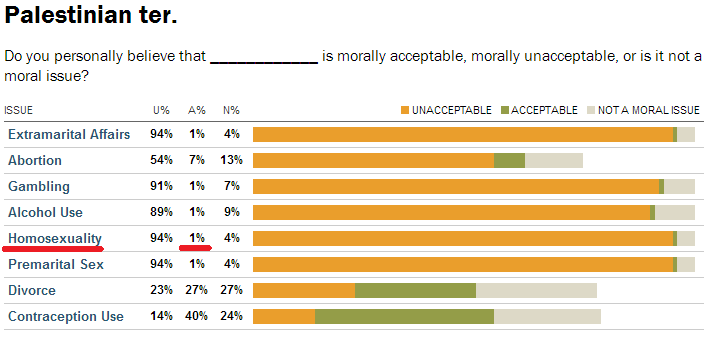One of the more bewildering aspects of the UK media’s advocacy on behalf of the Palestinian cause is how many putatively liberal journalists reconcile their views on Israel-Palestine with undeniable evidence attesting to decidedly reactionary political values within Palestinian society.
While news of Israel’s liberal advantages in the region on a myriad of social issues are often cynically dismissed as ‘hasbara’, or even framed as efforts to ‘whitewash‘ the occupation, news of Palestine’s less than enlightened views on the rights of gays, women and religious minorities are either buried or, sometimes, even excused as the result of Israeli oppression.
As case in point of such news which won’t reach the pages of the Guardian – or, likely, any other UK broadsheet – is the recent publication of a Pew Global Survey on Morality.
The Pew survey asked tens of thousands of respondents in 40 countries what they thought about moral issues such as homosexuality, abortion, premarital sex, alcohol consumption, divorce, and the use of contraceptives. For each issue, respondents were asked whether this is morally acceptable, morally unacceptable, or not a moral issue.
Though an April 27th Haaretz report on the poll’s results focused narrowly on the conclusions regarding Israel – noting that Israel was more liberal than most of the world, on average, when it comes such moral issues, Haaretz didn’t focus on the results for Palestinians (in Gaza and the West Bank).
Here’s the Pew graph for the ‘Palestinian territories’. (Note that orange is used to indicate ‘unacceptable’, green is ‘acceptable’, while grey indicates people who didn’t believe the topic was a moral issue.)
As the graph show, only 1% of Palestinian respondents believe that homosexuality is morally ‘acceptable’ behavior. (The only other countries with the same results were Egypt, Pakistan, Ghana, Nigeria, and Uganda.)
Further, such results are fully consistent with reports detailing the climate of fear Palestinian gays and lesbians endure due to widespread and often codified intolerance. While the Palestinian Authority has no civil right laws that protect LGBT people from discrimination or harassment, and the International Lesbian, Gay, Bisexual, Trans and Intersex Association issued a report entitled “State-sponsored Homophobia” which noted that the penal code in Gaza renders homosexual conduct a crime punishable by up to 10 years in prison.
Moreover, “Palestinianism” has never included, for all but a small number of its proponents, a sober reflection on the likely moral and political consequences – for Jews and Palestinians – of the new political entity.
So, while it would be fair to ask ‘liberal’ pro-Palestinian activists if they have any realistic cause for hope that a newly independent Palestinian state would inculcate their citizens with a spirit of tolerance towards its sexual minorities, and enact legislation protecting their rights under the law, perhaps the more important question is: Do they even care?






